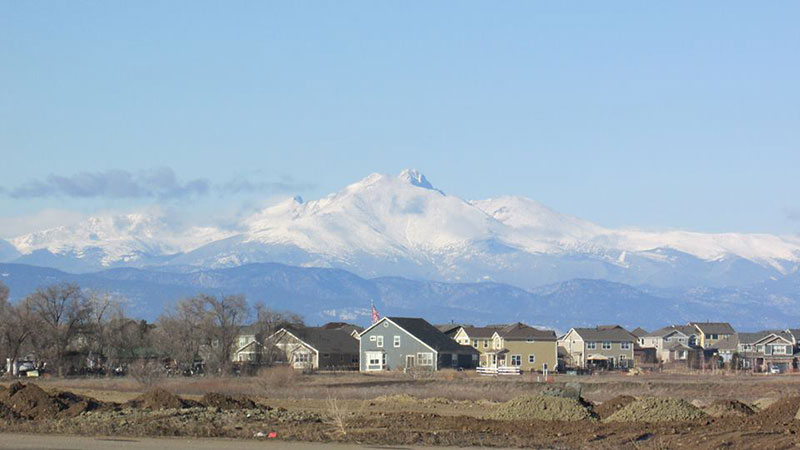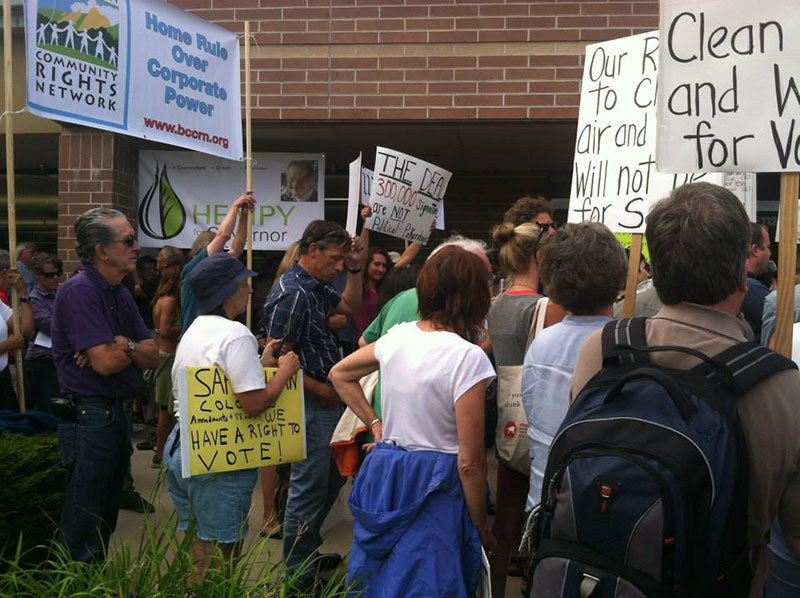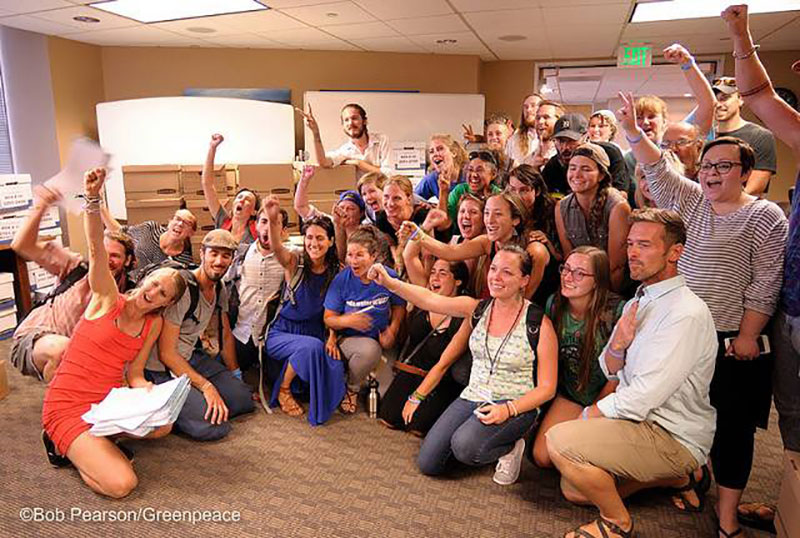After This Long Night, a New Day will Come
A Young Person’s First-Hand Account of Trying to Defeat the Political Arm of the Fossil Fuel Industry in Colorado
I'm all too familiar with the fossil fuel industry polluting our democracy.
I'm a young person, born and raised on the Front Range of Colorado and I have become increasingly engaged in local elections in various ways. Each time it seems like there's about to be a victory for people-powered efforts to put our communities over fossil fuel profits, the industry steps in, pours money in, and continues to destroy this beautiful place I call home.
Thanks to the political influence of the fossil fuel industry in Colorado politics, there are now 54,332 active oil and gas wells in Colorado as of April 2017, many of them densely packed into Weld County or the southwest area of the state. I live in Boulder County, a County that borders Weld. The city I live in, Boulder, as of April, now has an expired moratorium on fracking and fracking permits are already approved for Boulder, even after a fracking well exploded in Firestone this May (a town located in Weld County), that killed two men. While I’ve fought hard to keep the industry out of my hometown and state, my community hasn’t built enough power yet and the industry has rapidly taken over.
This piece is my first-hand account of trying to defeat the political arm of the fossil fuel industry within Colorado politics and a call to action toward building people power against the fossil fuel industry within the electoral arena. While times are dark, the sun must always rise, and there is always a reason for hope.

The Pollution of Colorado's State Politics
I truly became aware of how entrenched the fossil fuel industry was in Colorado politics in 2014, when I was working on a community rights ballot initiative to give local communities the right to restrict oil and gas development without being sued by the state.
If you didn't know, it's technically illegal for several local municipalities on the Front Range to ban oil and gas development, because they are what is known as Statutory Counties. In essence, this means that the state government can pre-empt their ability to make local, self-governing laws. When the city of Longmont's voter-approved ban on fracking led to Governor Hickenlooper suing the city, it was clear that the state wasn't going to protect the people of Colorado. We needed local control to be able to ban fracking and other destructive projects.
This experience led me to work on a county-wide ballot initiative to give Boulder County (where the city of Longmont is located) local control over oil and gas development. At the time, there was also another ballot initiative on the table, proposed by Colorado Congressman Jared Polis. Congressman Polis was proposing two statewide ballot initiatives that would support communities to protect themselves from fracking through local control and setbacks on a statewide level.
When it was clear that the County-wide ballot initiative I was working on wasn’t going to have enough signatures to qualify for the ballot, I turned my attention to Congressman Polis's ballot initiatives—which were looking like they had a good shot of making the ballot. If they did, it would have been an unprecedented victory against the oil and gas industry. As I would later learn from my efforts helping to lead a similar statewide ballot initiative, the oil and gas industry is terrified of anything amounting to a statewide ban or restriction on development.
In hindsight, it shouldn't have been surprising when Congressman Polis reversed his decision to submit the grassroots-gathered 320,000 legal petition signatures at the very last minute. But at the time I was shocked. While I've never believed the government was going to save us, suddenly all my trust in the political establishment crumbled. Representative Polis, a seemingly liberal Democrat—whom I had even met at my high school a couple of years earlier—had suddenly sided with the industry and turned his back on my entire generation. What had happened?
Governor Hickenlooper had to make a fast move. So he leaned on his friends in the fossil fuel industry to get a little help.
While I already despised Governor Hickenlooper, a former geologist for Buckhorn Petroleum, for suing Longmont, what I was about to learn would shake up my understanding of the oil and gas industry's ties with the political system. That summer, Governor Hickenlooper had called the state legislature back into session to reach a legislative compromise to hold up and block Polis's petition gathering effort. With a tight August 4th deadline to turn in signatures, Governor Hickenlooper had to make a fast move. So he leaned on his friends in the fossil fuel industry to get a little help.
Hours before the anti-fracking ballot initiative signatures were to be turned in, Hickenlooper bribed Polis into making a compromise that would define the role of the fossil fuel industry in Colorado politics for years to come. In exchange for throwing away the anti-fracking initiatives, Hickenlooper agreed to retract the lawsuit against Longmont. In addition to this, Hickenlooper said he would get the fossil fuel industry to withdraw two pro-drilling ballot initiatives that the oil and gas industry were trying to also get on the ballot at the time. The result: Polis threw away the 320,000 democratically collected signatures, and Hickenlooper selected an industry-stacked task force to “mediate” conflicts over oil and gas development in the state. When I saw people like Dan Kelly—a recently-retired executive from oil and gas company Noble Energy—appointed to Hickenlooper's task force, I knew it would be woefully ineffective in protecting Coloradans' health and safety. As I'd seen too many times already, this industry has little interest in putting people's lives over their oil and gas profits.

A Fossil-Fueled Assault on Grassroots Organizing
Fast forward to the summer of 2016. I had just graduated from college and come back to my hometown of Boulder, Colorado. Oil and gas production in Colorado had continued to skyrocket, so much so that I could barely see the mountains when I drove from Weld County to Boulder, because there was so much smog in the air.
Feeling an obligation to protect the place I call home, I helped to lead a statewide, entirely grassroots version of Polis's setbacks and local control initiatives. If passed, our version (introduced as Initiatives #75 and #78) would mandate half-mile setbacks from occupied structures. They would also make changes to the Colorado Constitution allowing local municipalities to control oil and gas development without pre-emption from the state. Likewise, if passed, over 90% of proposed new oil and gas development within the entire state would be prevented. The initiatives were the Colorado oil and gas industry's worst nightmare yet.
So to no surprise, the industry revealed its true form, pulling its full weight within Colorado politics. When I started helping to lead the campaign to pass these initiatives, I had no idea what was in store for our small, grassroots team. While the effort started off slowly, the incredible leadership of everyday people quickly ramped up the amount of signatures we were gathering, to where the initiative was looking to make the ballot. The oil and gas industry got terrified, and immediately activated a front group, called Protect Colorado.
Protect Colorado, along with other oil and gas industry groups, proceeded to spend over fifteen million dollars to run a voter suppression campaign titled “Decline to Sign.” They hired a paid harassment firm called Black Diamond Outreach LLC to follow and harass grassroots leadership, specifically targeting women and the elderly. Some of the intimidation tactics they employed with grassroots leadership like myself included: following us around with video cameras and recorders, planting industry agents into our canvassing trainings, and getting an oil and gas mole on our campaign Slack communication platform. This harassment came on top of the oil and gas industry running voter suppression TV ads, putting up voter suppression billboards, running a counter-ballot initiative, going door-to-door to misinform voters, and paying people to dress up in pencil suits and yell at voters. During this time, I happened to get on the radar of the industry as a threat, and even became a regularly featured target of an Oil and Gas social media misinformation project called “Divestment Facts.” It was both a physically and psychologically exhausting campaign to work on, to say the least.
Eventually, our small grassroots effort collected enough signatures to qualify the anti-fracking initiatives for the ballot. As we approached the Secretary of State's office with boxes and boxes of signatures loaded into a large U-Haul truck, about ten industry professionals started trying to block us as we ran up and down the escalators in the Secretary of State building to get the signatures in on time. The Oil and Gas industry was determined to stop us until the very end, even going so far as to try and take the parking spaces at the Secretary of State's office so we would have nowhere to pull up to unload the boxes of signatures.
With enough signatures submitted to qualify our initiatives for the ballot, I honestly felt like an impossible task had been accomplished. I felt a sense of hope that people power could eventually win. But my hope was short-lived.
I didn't think that the entrenched money of the fossil fuel industry in Colorado politics could go any further, but it turns out I was wrong. The Republican Secretary of State, Wayne Williams, is also a puppet for the Oil and Gas industry in Colorado. Williams happens to be in power thanks to a political machine known as “Colorado Concern” and “the Starboard Group.” The Starboard Group, founded by Republican political operatives Kristin Strohm and Katie Behnke, is an incredibly powerful Republican fundraising firm in the Western United States and nationally. Pretty much every viable political candidate in Colorado has to go through the Starboard Group, because the vast amount of the state's largest campaign donors—both corporations and individuals—is controlled by Starboard. To make a long money trail from the oil and gas industry into the politicians' pockets short: to get elected in Colorado, you usually need to take money from Starboard, as well as Colorado Concern, an industry conglomerate funded by oil and gas companies Anadarko Petroleum and Noble Energy.
I felt a sense of hope that people power could eventually win. But my hope was short-lived.
The bottom line: Williams, with all his special interests backing him, eventually ruled that not enough of the anti-fracking signatures that we submitted were valid. Our team was surprised, because we had done a thorough job of checking verification rates beforehand. Refusing to believe it, our grassroots team launched a last-ditch effort to verify all the signatures his office had rejected. But facing increased burnout in the campaign and a large list of hard-to-track-down voters, we didn't have enough time to contest the ruling. The initiative never made the ballot.

We're Playing Different Games
The game that the oil and gas industry is playing is a political one. If we only fight on issues, we'll never win—because that's not where the oil and gas industry is playing.
How does this whole story further connect with the bigger picture of entrenched oil and gas money in Colorado politics? Noble Energy and many of the people Governor Hickenlooper placed on his task force in 2014 are some of the largest contributors to Protect Colorado and various oil and gas front groups, such as Colorado Concern, that elect candidates to obstruct grassroots progress.
Over and over again, we can see that the oil and gas industry is infiltrating all sorts of positions in Colorado politics, from the Governor to the Secretary of State—and this is not a one-time effort. The industry has long-term plans to manipulate regulatory agencies and load local government bodies with industry professionals.
The game that the oil and gas industry is playing is a political one. If we only fight on issues, we'll never win—because that's not where the oil and gas industry is playing. Every year, the industry's people get elected, start front groups, spend millions of dollars to defeat and infiltrate democracy, and ultimately destroy lives.
As an organizer who is serious about building power, I'm devastated—because the oil and gas industry's influence in politics has crushed grassroots power and citizens’ initiatives time and time again. I'm tired of just losing because oil and gas money keeps defeating people power, and I'm going to continue to fight with people I deeply care about for my home.
After This Night, the Sunrise
That's why this summer, I'm excited to get involved with a new movement to change the political playing field for good. It's called the Sunrise Movement, and it's working to build a nonviolent army of hundreds of young people going all-in as volunteer organizers for the 2018 midterm election.
In August, I’m taking action with the Sunrise Movement and dozens of other young people to disrupt business as usual during town hall meetings and fancy fundraisers. I'm choosing to speak out during the summer recess through creative actions because if I can't even express my voice through a supposedly “democratic” initiative process, it's time to take it straight to industry-funded politicians’ houses, offices, and halls of political power.
If you’re ready to join me this summer and beyond, all you have to do is sign up here.
While it may be challenging to find hope during these times, the resilience of people who keep fighting against all the odds keeps me going. After this night, a new day will come. I fight for that inevitable sunrise.
The Sunrise Movement is a member of the Power Shift Network, along with dozens of other grassroots organizations mobilizing young people to fight the climate crisis and build a just, clean energy-powered future. To see a full list of Power Shift Members, check out our Network Members page here.